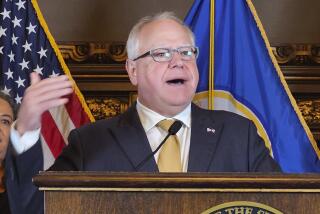Some Late-Inning Tips Can Turn Odds Around for Dukakis the Rookie
- Share via
National polls showing Vice President George Bush leading Gov. Michael S. Dukakis by small-to-large margins have led a number of pundits to prematurely count Dukakis out.
Don’t place your bets yet.
Dukakis has been on a nonstop downer since his party’s Atlanta convention. Before the convention he had a relatively easy path to the nomination and, with Jesse Jackson his principal competitor, the look of a political moderate. Since the convention he has gotten the same treatment that any little-known party nominee faces in a general-election contest: The opposition has defined him according to its terms of reference (in this case as a high-tax/big-spending/weak-on-defense/permissive Massachusetts liberal) rather than his own. So the governor’s shortcomings, rather than the vice president’s weaknesses, have become a principal topic of the campaign.
Policy and electoral fundamentals favor Bush. The country is at peace and enjoying economic growth, low inflation and high employment. The electoral map also favors Bush. The southward/westward/suburban population flows of recent years make it difficult for a liberal Northern Democratic presidential candidate to win any national election when international, economic or major ethical failures cannot be credibly laid at the door of the GOP nominee. To win the 1988 election, Dukakis must win four of the Big Seven battleground states of California, Texas, Ohio, Illinois, Michigan, Pennsylvania and New Jersey. A tough order.
Dukakis--an intense, earnest candidate --also faces the same problems of communication that dogged Lyndon B. Johnson, Richard M. Nixon and Jimmy Carter before him: There is no change of pace. Voters, after eight years of an agreeable Ronald Reagan, simply are not prepared to submit to the return of a glowering, scolding or angry presidential presence in the first five minutes of their nightly network news.
Yet, with all this against him, Dukakis still has the time and the means to win the election. Here is how:
Shift public attention to the substantial and important domestic shortcomings of the past eight years. The vice president’s most glaring weakness is his association with what he himself described in 1980 as “voodoo economics” and the accumulation since that time of a public debt exceeding the total debt racked up by all previous Presidents since George Washington. Voters know about the Reagan-Bush deficits, and they properly are worried about their economic future. Yet Dukakis, by evading specificity about his own program to reduce the debt burden, has thus far walked away from this biggest issue. It’s time now to confront it and thus put Bush in a very uncomfortable spot.
Other clear-and-present weaknesses are there for exploitation--waning U.S. international competitiveness, increases in the homeless and hungry on our streets, still-failing public schools, the squeeze on middle-income families trying to buy a home or send their kids to college, the sense that a laissez-faire Administration has let environmental degradation run out of control and, not least, Bush’s selection of a grossly unqualified Sen. Dan Quayle as his running mate.
Dukakis must avoid the issues and places that are Bush’s strength . Last week’s national-defense/foreign-policy barnstorming tour probably was a fool’s errand. By drawing attention to a subject on which Bush enjoys greater public confidence than he, and by seeming to amend and shade his own previous substantive positions, Dukakis probably has more deeply submitted to Republican terms of reference.
Dukakis and Sen. Lloyd Bentsen must emerge as clear winners in their debates with Bush and Quayle. That would mean forcing the debate agenda onto Democratic, rather than Republican, issues (as above) and pressuring Quayle in particular into a damaging mistake of either commission or ignorance. Since the debaters will not carry notes to their podiums, it should be no great task to make Quayle put one or both feet in his own and Bush’s mouth. His knowledge and background are too shallow to carry a convincing case for 90 minutes.
Dukakis must stop worrying about being “Mondalized” (that is, appearing captive to groups and constituencies in his own party) and engage all elements of the Democratic Party in his campaign . Progress has been made, but the Dukakis campaign must fully dispel the impression that it consists for the most part of the candidate himself and a handful of ambitious young Boston-Brookline-Cambridge aides. Otherwise they really will soon be running alone.
Dukakis must discover that missing change of pace . With a smile, a joke, an occasional moment of self-deprecating humor, Dukakis would dispel the growing notion that he’s a nonstop grinder. There’s still more than enough time to do this--in the debates, in paid TV commercials, in informal interviews and staged events.
The same polls that show Dukakis trailing Bush also show up to 15% of the total electorate genuinely undecided about its vote. If he takes the steps above, Dukakis still has a real chance to win.
More to Read
Get the L.A. Times Politics newsletter
Deeply reported insights into legislation, politics and policy from Sacramento, Washington and beyond. In your inbox twice per week.
You may occasionally receive promotional content from the Los Angeles Times.










